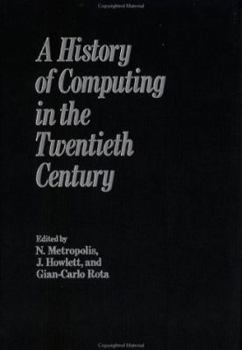< Back to Search Results
History of Computing in the Twentieth Century
A History of Computing in the Twentieth Century focuses on the advancements in the processes, methodologies, programs, and techniques in computing. The selection first elaborates on computing developments in Cambridge, U.S.A., pioneering work on computers at Bletchley, and the COLOSSUS. Discussions focus on secrecy and priority, the first COLOSSUS, MARK II COLOSSUS, postwar developments in computing, and the HEATH ROBINSON project. The text then ponders on Turing's work at the National Physical Laboratory and the construction of Pilot ACE, DEUCE, and ACE, the Smithsonian Computer History Project, and programming in America. Topics include origins of FORTRAN, optimization techniques in FORTRAN, DEUCE computer, and the Pilot ACE. The book takes a look at the development of programming in the USSR, advancement of programming languages, and reflections on the evolution of algorithmic language. The book also examines the computer development at Manchester University, the sieve process, MANIAC project, and the ENIAC project. The selection is a valuable reference for computer science experts and researchers interested in the development of computing.
Format:Hardcover
Language:English
ISBN:0124916503
ISBN13:9780124916500
Release Date:October 1980
Publisher:Academic Press
Length:659 Pages
Weight:2.45 lbs.
Dimensions:9.5" x 1.3" x 6.3"
Customer Reviews
2 ratings
Needs An Update to End the Century
Published by Thriftbooks.com User , 21 years ago
Written in 1980, this book desperately needs an update, so that it in fact spans computing across the entire 20th century. The author/editor Nick Metropolis is quite famous in scientific circles for what is now known as the Metropolis-Monte Carlo algorithmn. It is often used in numerical integration, where this might be over several variables. Before Metropolis found his method, many such problems were often impractical to compute. So he is well qualified to write a history of computing.The book's time span is an era just before the advent of personal computers and workstations. A lot of the narrative discusses government computing, often military-classified. The heritage of computing. The first modern computer, ENIAC/MANIAC, was built during World War 2 to solve problems in the Manhattan Project at Los Alamos. Ever since, Los Alamos has been at the forefront of high powered computing. Where Metropolis was for decades, in fact.Soviet computing gets a mention, but understandably sparse. This book was written during the Cold War, and much of the other side's effort was very secretive. So if indeed Metropolis did understate the Soviet effort, it was no fault of his own.The discussion of commercial computing tends to revolve around IBM and its 360/370 families. IBM dominated commercial computing so thoroughly that its competitors were almost an afterthought.
Crucial, fascinating history of primordial computing.
Published by Thriftbooks.com User , 25 years ago
I bought my copy in 1981, and I am *still* using it in my research and historical art projects. An absolutely critical, major book, irreplaceable source material by actual participants of the dawn of computing -- the only lack are contributions from Turing and von Neumann, as the editors note, due to their premature deaths.This is a technical history, and some essays contain technical details. A few border on pedantic, two are bad, but most utterly shine and are brilliantly illuminating. The list of references is wonderful, and with the 'net, may even be findable (most are in-context).I cannot express what a useful and interesting book this is. Though it might appear to concentrate on U.S. efforts due to the conference location (Los Alamos) in fact most of the early computer work -- and the first *two* running stored program computers -- were British, and are well covered here. A lot of the British work was only declassified in the late 1970's, so the participants are able to talk about it for the first time publically.There are also papers on early USSR developments, and history of pre- and proto-computing equipment. Last, but hardly least, for me, in I.J. Good's essay I learned for the first time of Turing's open and unashamed homosexuality -- "... it was only after the war that we learned he was a homosexual... if [security] had known... he might not have obtained his clearance and we might have lost the war." Indeed!Sadly, this was literally a last-minute collection of data; most of the contributors were quite old when it first published in 1980.Amusingly (or not), I thought the book was expensive in 1981, at $29.50; now list price is over $100... but if you are serious this is a book to keep forever -- I would pay it now without hesitation (but critical books being this expensive keeps it out hands that could use it...)This, plus Andrew Hodges' ALAN TURING: THE ENIGMA, have been two of my major inspirational sources for close to 20 years -- what more can I say?






